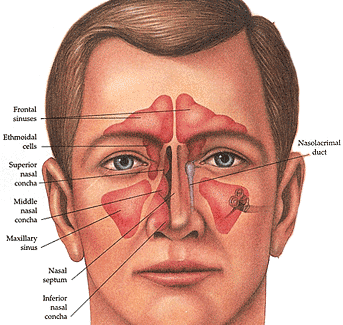Our senses of smell and taste are deeply interconnected and play a vital role in how we experience the world. From enjoying our favorite meals to identifying familiar scents, these senses greatly influence our quality of life. But what many people may not realize is just how much sinus anatomy impacts these senses.
Understanding Sinus Anatomy and Its Role in Smell
The primary function of the sinuses is to produce mucus that moisturizes the nasal cavity, traps dust and particles and filters the air you breathe. However, the sinuses also play a critical role in your ability to detect smells.
Here’s how the process works:
- When you breathe in through your nose, air passes over the olfactory receptors located in the upper part of the nasal cavity.
- These receptors, which are responsible for detecting different odors, send signals to your brain, where the smells are processed and identified.
- The open pathways of the sinuses allow air to flow freely through the nasal cavity, enabling your olfactory receptors to function effectively.
Why Sinuses Matter:
When your sinuses are healthy and clear, this entire process runs smoothly. But when the sinus anatomy becomes affected due to conditions like infections or inflammation, airflow is restricted, reducing your ability to smell.
How Sinus Issues Impact Smell
Several common sinus problems can interfere with your sense of smell:
1. Sinus Infections (Sinusitis)
Sinusitis, or inflammation of the sinuses, is one of the leading causes of smell loss. When the sinuses become swollen due to an infection or allergy, the passages narrow, restricting airflow. This limits the amount of air that reaches the olfactory receptors, impairing your ability to detect odors.
Symptoms of sinusitis include:
- Nasal congestion
- Facial pain or pressure
- Thick mucus discharge
- Loss of smell and, often, taste
In some cases, chronic sinus infections can cause long-term or even permanent damage to the olfactory receptors, leading to partial or complete loss of smell.
2. Nasal Polyps
Nasal polyps are soft, painless growths that develop in the lining of your nasal passages or sinuses. They can block airflow, making it difficult for scents to reach the olfactory receptors. People with chronic sinusitis or allergies are more likely to develop nasal polyps, which can significantly diminish their sense of smell.
3. Deviated Septum
A deviated septum, where the wall between the two sides of the nose is displaced to one side, can also cause issues with airflow through the nasal cavity. If airflow is obstructed on one or both sides, your ability to smell can be compromised.
4. Allergies
Seasonal or chronic allergies cause nasal inflammation, congestion, and mucus buildup, which can block the olfactory receptors. Prolonged exposure to allergens without treatment can lead to more frequent and severe losses of smell.
The Connection Between Smell and Taste
It’s not uncommon for people to think they’ve lost their sense of taste when, in fact, their sense of smell is impaired. This happens because smell and taste are closely linked; about 80% of what we perceive as taste comes from our ability to smell.
When you eat, odor molecules from your food travel up the back of your throat to your nasal cavity, where they stimulate the olfactory receptors. These receptors work with your taste buds to create a full flavor experience. Without the ability to smell, many flavors become dull, and food may taste bland or less enjoyable.
How Sinus Problems Affect Taste
When sinus issues block airflow, it disrupts this process, leading to dysgeusia—a condition where taste is distorted. For example:
- You may find that foods you once loved now taste bland.
- Sweet or salty foods may taste metallic or different.
- You might experience a complete loss of taste in more severe cases, particularly during or after a sinus infection.
The key here is that most changes in taste due to sinus problems are actually related to your loss of smell, which heavily influences how you perceive flavors.
Conclusion
The sinuses play a vital role in our ability to smell, which in turn heavily influences our sense of taste. When sinus issues such as infections, blockages, or nasal polyps occur, they can disrupt airflow to the olfactory receptors, leading to temporary or even permanent loss of smell and taste.
For individuals experiencing changes in their sense of smell or taste, addressing the underlying sinus problems with appropriate treatments is key to restoring these essential senses. If sinus issues persist, consulting with a healthcare professional can help identify the cause and provide effective treatment options.
FAQs
1. Can sinus problems cause a permanent loss of smell?
In most cases, loss of smell due to sinus issues is temporary. However, chronic infections or untreated conditions can lead to permanent damage to the olfactory receptors, resulting in long-term loss of smell.
2. How can I regain my sense of smell after a sinus infection?
Treatment options include nasal decongestants, corticosteroids, nasal irrigation, and sometimes antibiotics. In some cases, olfactory training may help restore your sense of smell.
3. Why does food taste bland when I have sinus congestion?
Since much of what we perceive as taste comes from our sense of smell, sinus congestion blocks airflow to the olfactory receptors, making it harder to detect flavors, which causes food to taste bland.




